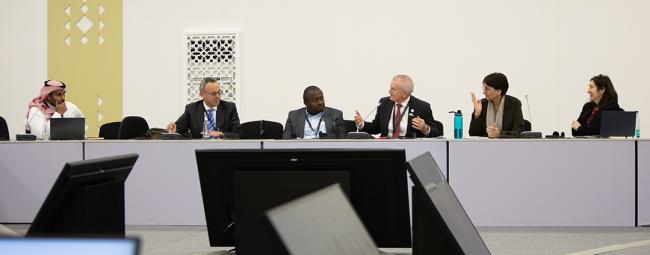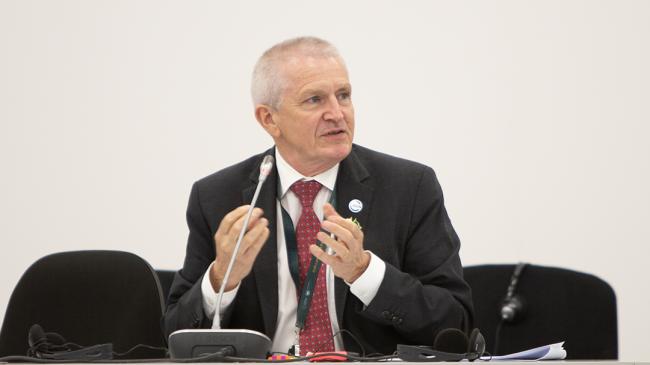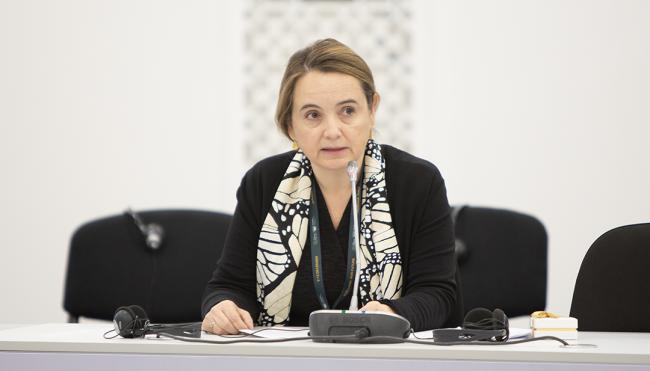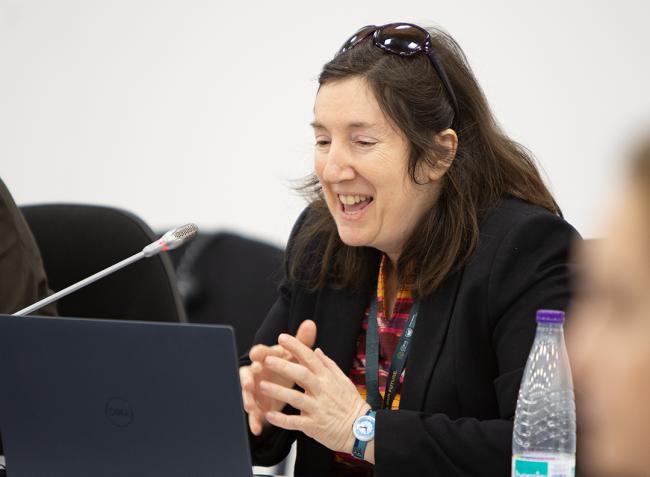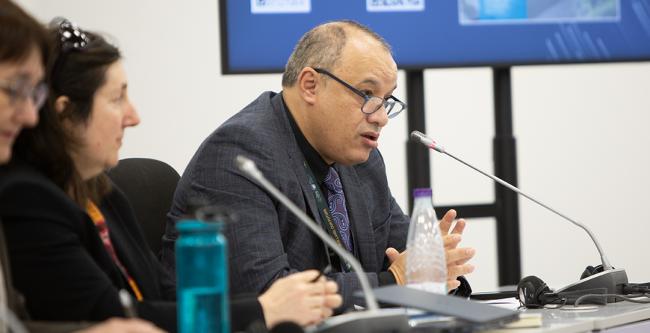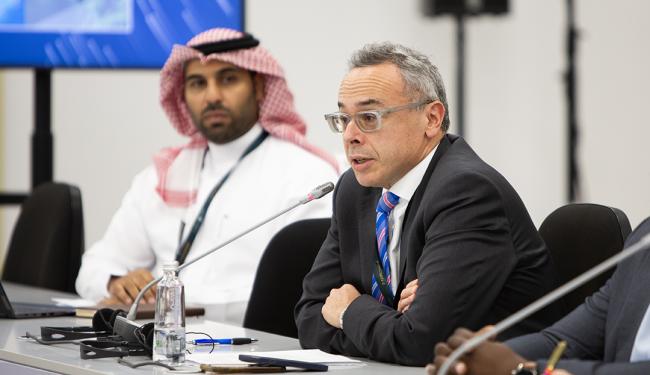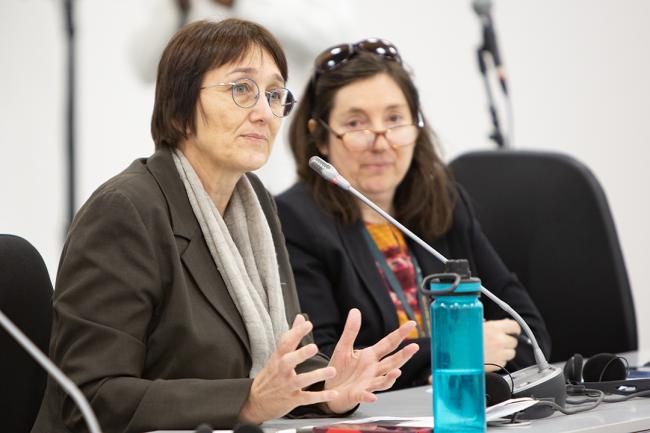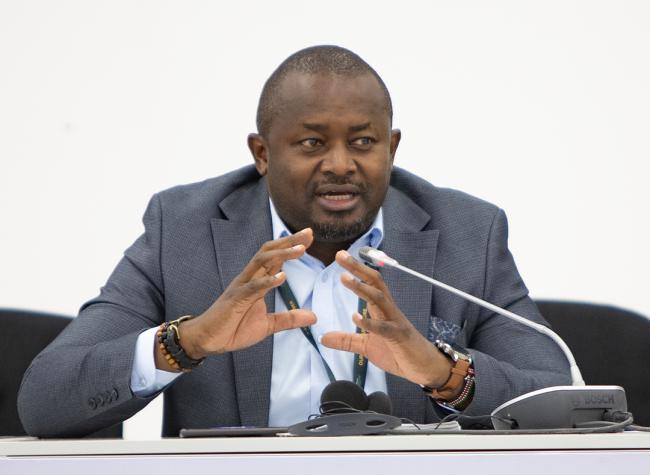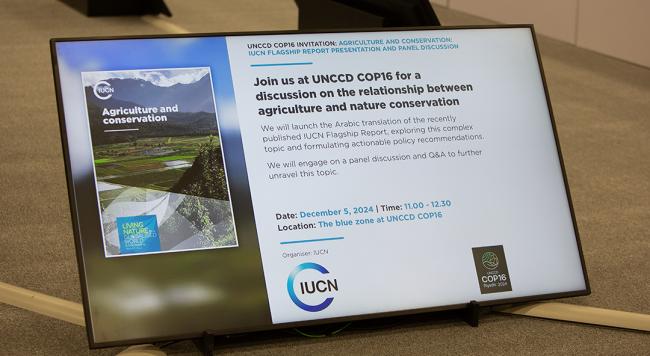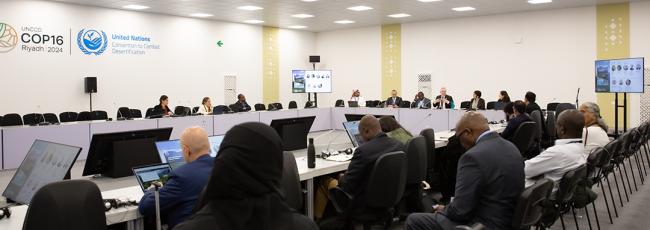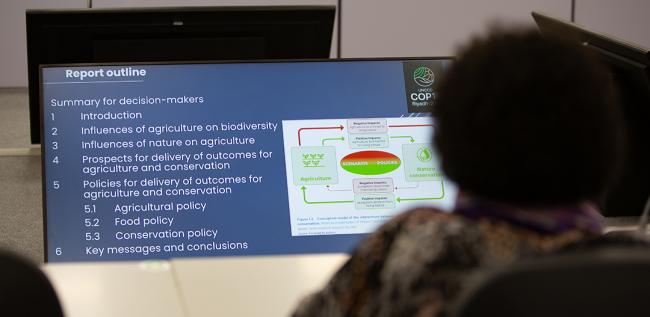About
Conservation strategies can increase food security—for example, through watershed restoration, and protection of pollinator species. Participants discussed how to upscale approaches to produce wins for both agriculture and the environment.
IUCN’s 2024 Agriculture and Conservation report, the second in its flagship series, demonstrates with new modelling that feeding the world and conserving the biodiversity that agriculture depends on are both possible. This event showcased insights from this critical report.
Moderating the event, Stewart Maginnis, Deputy Director General, International Union for Conservation of Nature (IUCN), noted the launch of the new Arabic translation of the report.
Grethel Aguilar, Director General, IUCN, said the report addresses one of the most pressing issues of our time, and recalled that agriculture contributes to nearly half of the current species extinction crisis.
Pascale Bonzom, Head, Food and Agriculture Systems, IUCN, explained that, while it is well understood that agriculture drives threats to species and biodiversity loss, what it less well known is many species have agricultural systems as their habitat; for example, 17% of species on The IUCN Red List of Threatened Species use agriculture as a habitat, and 86 species from the Red List are found only in agricultural habitats. She explained that the report relied on modeling by the Natural Capital Project at the University of Minnesota, with analysis showing that certain changes, such as better land management, using payments for ecosystems services and regulatory changes, can unlock large benefits. She stressed that systems approaches are needed that are appropriate to location, scale and production, adding that governments should make efforts to reform harmful agricultural subsidies.
Hany El Shaer, Regional Director, West Asia, IUCN, noted that his region was not only one of the most impacted by climate change, desertification, and marine biodiversity loss, but that political instability is exacerbating these threats. He noted that the report was important for his region because it outlines clear ways to transition to integrated approaches which are critical to allow food systems, ecosystems, and communities to thrive together.
Juan Carlos Mendoza, Director, Environment, Climate, Gender, and Social Inclusion Division, International Fund for Agricultural Development (IFAD), noted that his organization traditionally interacts with agricultural ministries, whose first priority tends not to be conservation. He stated that smallholder farmers produce one-third of food globally and are key actors in this transition as many already rely on practices such as regenerative agriculture and agro-ecology. He added that IFAD Member States have requested, for the first time, an integrated strategy on climate change, environment and biodiversity. He said the IUCN report is an important tool to address this request from an institution whose main mandate is to ensure food security for the world’s populations.
Maginnis then introduced the panelists and invited them to comment on key challenges and possible approaches going forward.
Claudia Ringler, Director, Natural Resources and Resilience, International Food Policy Research Institute (IFPRI), CGIAR, stated that showing how conservation strategies can increase food security is possible, as has been done, for example, in cases of protecting water resources and pollinators. She recommended “bundled interventions” that can benefit the global shared objectives of food security, nutrition, and agricultural health.
Stephen Muchiri, CEO, Eastern Africa Farmers Federation (EAFF), argued that farmers do conduct sustainable practices, but these need to be inventoried so that they can be adopted at scale, for example, across similar locations and types of farming enterprises. He called for giving greater prominence to sustainable farming practices in government policies and statements, questioning: “How do we get it into the Minister’s speech?”
Abdullah Alhumaid, Director of Agriculture, Royal Commission for AlUla (RCU), Saudi Arabia, described the integrated approach to agriculture in this cultural heritage region under the Saudi Vision 2030 strategy for the economy and society. He explained that the government is able to address challenges across the value chain in AlUla, from biosecurity to livestock management and market strategies, in order to advance the vision of boosting agricultural production while adopting conservation aligned with heritage and innovation.
Responding to a question about agricultural subsidies that do not necessarily improve on-farm productivity, Mendoza emphasized that subsidies may be reoriented toward different purposes, and the question is how to achieve such a transition. Ringler added that many subsidies do not benefit women or poor farmers, and supported subsidies that provide social safety nets and support farmers’ transitions toward sustainability. Alhumaid said a good place to start the transition would be to work downstream with the private sector, as well as encourage farmers to establish their own businesses.
Muchiri commented that a key challenge for farmers transitioning to sustainable practices is that multinational companies tend to be their main sources of information, which tends to promote commercial interests.
Participants posed questions on: how to avoid ecological damage in upscaling practices that may work only in some areas but not in others; how to address the problem of farm properties becoming ever smaller as they are divided among several heirs; and what should be the role of youth in agriculture, as many young people do not want to work in this sector.
In a round of responses by panelists, Bonzom favored focusing on less controversial issues, such as reducing food loss and waste, noting that currently one-third of all food produced is lost. Ringler urged moving towards questions of food and nature justice by focusing on young people and the poorest in society. She noted, for example, that governments are concerned with generating off-farm jobs, and that solar energy systems for rural areas may increase such employment.
Muchiri noted that land issues persist due to insecure land tenure. He called for giving attention to the impacts of international carbon markets on decisions around land use. Alhumaid emphasized the role of governments in making the sector more sustainable and attractive to youth.
In summing up, Maginnis thanked all speakers and noted, among the issues raised: the importance of on-farm income in addressing conservation aims; the role of blended finance; the need for farmer access to credit; and the responsibility of governments in supporting transition pathways.
Organizers: IUCN
Contact: silvia.cardellino@iucn.org
Website: www.iucn.org
To receive free coverage of global environmental events delivered to your inbox, subscribe to the ENB Update newsletter.
All ENB photos are free to use with attribution. For UNCCD COP 15 Side Events, please use: Photo by IISD/ENB | Angeles Estrada Vigil

